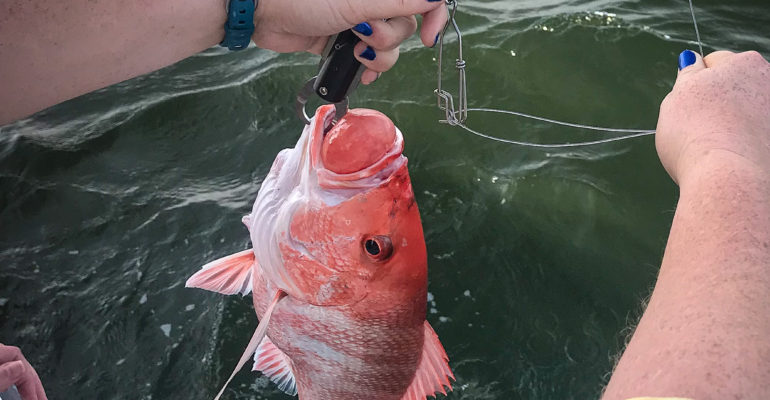The Direct Enhancement of Snapper Conservation and the Economy through Novel Devices Act of 2020 (DESCEND Act of 2020) was signed into law on January 13, 2021. The new Act will require commercial and recreational vessels (including for-hire) to have a venting tool or descending device rigged and ready to use when fishing for reef fish species in Gulf of Mexico Federal waters. The DESCEND Act of 2020 will go into effect in January 2022.
The DESCEND Act of 2020 was passed in efforts to reduce mortality caused by barotrauma on reef species like red snapper. Barotrauma is an increase in internal gas pressure caused by the sudden changes in pressure that fish undergo when being reeled up from depths generally greater than 90 feet, though it can occur in shallower waters of 33 feet or more. Fish experiencing barotrauma have difficulty quickly swimming back to catch depth, often floating on the surface where they are vulnerable to attack by dolphins, sharks, and birds.
When asked about the impact this new legislation will have on the Gulf, LDWF Assistant Secretary of Fisheries Patrick Banks said “The passage of the DESCEND Act will help to improve sustainable fishing opportunities and support Gulf of Mexico reef fish conservation for years to come.”
Descending devices are outlined as a weighed hook, limp clam, or box that will hold a fish as it is lowered to a sufficient depth to allow for recovery from barotrauma. A venting tool is a sharpened, hollow instrument that can penetrate a fish’s abdomen to release excess gas acquired as it was reeled up.
The next step for DESCEND Act of 2020 is for the Gulf of Mexico Fishery Management Council to develop an implementation plan along with outreach and education materials for all fishing sectors.
For more information on barotrauma, the different types of devices, and how to use them visit the LDWF Spotlight on Barotrauma at https://www.wlf.louisiana.gov/page/barotrauma.




